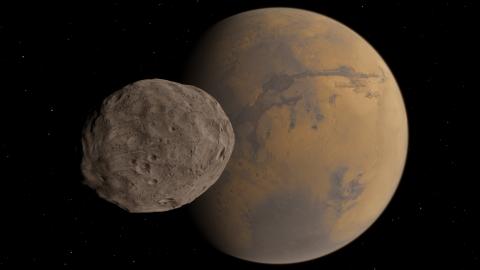New grant to study contamination caused by landing on Martian Moon

OU researchers are part of a project that will use state-of-the-art lab equipment to simulate the contamination expected when a spacecraft lands on the Martian Moon Phobos.
This is in support of a European Space Agency (ESA) mission that is currently being planned for launch in late 2025 to land the spacecraft, collect a sample and return it to Earth for detailed investigation.
The project, led by UK company, Fluid Gravity Engineering Ltd (FGE), seeks to measure the amount of contamination imparted on to the surface of the samples, how much of this is likely to stick to the materials present, and how the contamination from the landing rockets penetrates into the surface materials (generally thought to be a soil of small particles of rock and dust).
The results of this study will determine the sampling depth required to meet the stringent contamination requirements scientists are demanding and therefore is an important contribution to the required sampling method and therefore overall mission design. It will also have implications for other missions.
The OU team, Dr Ian Franchi, Dr Sam Eden and Dr James Mortimer from the Faculty of Science, Technology, Engineering and Mathematics, have been awarded £205,000 by the European Space Agency, to lead two main elements of the study and are designing and building a small-scale laboratory facility to conduct simulations.
In the first part they will be designing special ultra-clean simulated Phobos soils that can be exposed in the test chamber and using the unique Finesse mass spectrometer system in the School of Physical Sciences to detect amounts of contamination expected. These samples will be exposed to different types of rockets in a huge liquid helium-cooled (-269 ˚C) vacuum chamber used to simulate the conditions of deep space at the DLR (German Space Agency) facility in Gottingen.
“Most of the gases from the rockets will be based on compounds of hydrogen and nitrogen, but small amounts of carbon may also be present,” said Dr Ian Franchi, OU lead on the project. “Such elements are important to understanding the origin of Life on Earth and elsewhere and therefore the science planned demands the returned samples are collected as cleanly as possible.”
The other members of the team are:
- Fluid Gravity Engineering Ltd (lead)
- Nammo Westcott Ltd,(based near Aylesbury)
- DLR Gottingen
- University of Glasgow
- Natural History Museum
Quarterly Review of Research
Read our Quarterly Review of Research to learn about our latest quality academic output.

Contact our news team
For all out of hours enquiries, please telephone +44 (0)7901 515891
